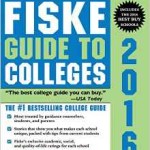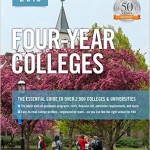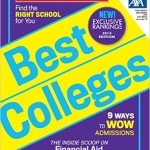Before you can Organize Your College Data, you must identify your Data Mining Resources, which will be invaluable in The College Search. These resources will enable you to compare ‘like data’ (4-year graduation rates, major & minors, etc.) for each College you are considering. In addition to these resources, you should Ask Current & Former College Students Where They Went & Why.
- The BEST resource is a College’s website. But remember they are marketing materials.
-

While glossy College Brochures are intended to make you fall in love with that College, they are also a wealth of information.
College Brochures often include information not found on the website, but they are also most definitely marketing material. I find the brochures can be very helpful when you are writing your “Why do you want to attend our College” essay.
- Common Data Set
- College Board
Many of the websites that offer detailed College information require you to create a log-in. College Board, who administers the SAT and SAT Subject tests, has a captive audience – most users will eventually create a log-in in order to take the SAT and/or SAT Subject Tests. For that reason, I believe, College Board does not require you to log-in to access a wealth of information. If you are early in the College Hunt, this may appeal to you. College Board offers advice on a wide range of topics, as well as a database of Colleges that can be searched by name. This database includes information on academics (majors offered, student/teacher ratio, etc.), admissions (deadlines, number of students admitted/denied/wait listed, etc.) and campus life (demographic breakdown of students, housing, etc.). College Board also has a search engine (“College Search” whereby you enter criteria (location, grades/test scores, financial aid, etc.) and they provide a list of Colleges that match that criteria. - College Scorecard – this US Department of Education website was launched as part of the Obama Administration’s initiative to lower the cost of College. Critics state that the information may be out of date – this is important when looking at factors such as tuition costs, although it’s helpful to see the average tuition cost, which adjusts tuition costs by the average financial & merit aid. The website also lists the average cost by income, which is a quick way to get a sense of tuition costs at a particular College for your family (although this does not take into consideration any Merit Aid you might receive). I like the way you can easily pull up facts like the average post-graduation salary. While I thought it would be helpful to see the default rates on loans, in fact the websites lists the percentage of students who have paid down as little as $1 off their loan balance in the first 3 years after graduating, which I don’t find to be particularly informative. When you are entering search criteria, I don’t like that many basic fields of study are not options for setting College criteria.
- Fiske Guide to Colleges

Their on-line resource only posts updates for the Fiske Guide, so you will either have to purchase the guide or go to your school’s Admission Office or the Public library. USA Today says Fiske is “The best College guide you can buy.” I have heard College Counselors describe this guide as the most accurate, unbiased guide to Colleges, and the few times I have met with a College Counselor, this is the guide in their arms. Fiske examines 300+ Colleges with a 2-4 page description, including academic and social climate. The Guide also indexes “Colleges Listed by State” and categorizes “The Best Buys of 20–“, “Private Universities Strong in Engineering”, etc. Make sure you are using a recent version, as this book is updated annually. Fiske has other guides, including Fiske Guide to Getting Into the Right Colleges. The Guides are also available in electronic (Kindle) format. - Peterson’s Four Year Colleges

In addition to their guides, Peterson’s has an online resource. I haven’t spent time actively comparing Petersons and Fiske to see if they cover the same information or if they have a different take. I read a review that said Peterson’s first section is a shorter summary of approximately 2500 Colleges, the second section is a more detailed description of 200+ Colleges that are actually written by the Colleges, and the third section is made up of indexes. A good idea would be to buy one of these guides and then read about your short-list of Colleges in the other guide via the library or your school. - US News & World Report Best Colleges

I think most people familiar with the Admissions process have mixed feelings about this on-line resource. The US News Colleges website focuses on ranking Colleges base on stats, which can be argued is less subjective. But by focusing ranking based on stats, you miss the story behind the stats. Furthermore, the methodology of ranking is most definitely subjective. US News does provide a service by offering easily accessible stats for Dolleges, but as their ranking program has increased in popularity, they are having a significant influence on College’s admission process. In 2011, selectivity made up 15% of US News’ College rank, which contributes to the selectivity Arms race amongst Colleges. Colleges are taking extreme (and costly) measures to increase their selectivity through practices such as huge marketing campaigns that garner increased applications, which results in lower acceptance rates. College statistics (how many men/women apply, what percentage of classes have fewer than 20 students, how many criminal offenses have taken place on campus, etc.) can help you get a feel for a College and whether you might fit the profile of the typical admitted student, but should be viewed with a focus on the information, not the US News Ranking. A fair amount of information is available for free on their website. If you pay $29.95 for the College Compass, you get more detailed information for one year. I found that US News waited more than a year before they required me to re-enroll. US News also publishes Best Colleges annually. See Data Mining – The Common Data Set for a free way to gather all of the information on the College Compass website.- This 2011 Malcolm Gladwell New Yorker article describes the difficulty in ranking disparate items, whether it be sports cars or Colleges, because of the ranking methodology – do you agree that a College’s selectivity (as defined by US News) should make up 15% of it’s score? Don’t get hung up on how your Colleges rank. If you want to get into details, look closely at why a College ranks the way it does – this will help you gain a better understanding of that College. One of Gladwell’s examples is how US News assesses student engagement with variables that include how many professors hold the highest degree in their field and salary, adjusted for region. Gladwell points out that salary and a high degree may be more a reflection of professor research, not engagement with students.
- College Counseling Blogs – I haven’t spend a lot of time reviewing the merit of these blogs, but here is a good list of blogs.
- Nacacnet.org – NACAC, the National Association for College Admission Counseling. Your College Counselor should be a member of this organization, which has a wealth of information available regarding searching for Colleges on their website, including the dates for large College fairs in your area. One of their blogs is worth looking at, called Admitted.
- The College Board is the organization that runs the PSAT, SAT and Subject Tests. Their website is exhaustive.
- ACT Student, like The College Board, provides much more information than preparing for and taking the ACT test.
- SAT and ACT Prep Guide – lists resources and tips to prepare for both the SAT and ACT.
- Princeton Review – PR creates lists of the “Happiest Students”, “Most Accessible Professors”, Students Study the Most”, etc., based on survey responses from 130,000 students at Colleges and universities across the U.S.
- Collegedata.com – College stats, search tools, option to log-in and create a profile. Data for individual Colleges include a scattergram “Admissions Tracker” for students who create a profile, tracking their GPA/Test Scores, where they applied and whether the student was accepted – you look up this information by pulling up a particular school. They keep this information tabulated by year. I find that lots of students create the profile, so you know who is applying, but many don’t go back to indicate whether they were accepted.
- College Confidential – posts by mostly High School students, but sometimes by parents, alumni, current students and Admissions Officers. Someone starts a post, say “Early Decision Scripps College” and people post what they think is relevant to that subject. No controls, so the conversations can be tedious (I find one of the most annoying to be “What are my chances?”, where people list their classes, GPA, test scores and achievements and ask people [as in mostly other prospective students – why do they think they are qualified to rank?] what their chances are of getting into a particular school). I think students want to go to College Confidential after they have applied to Colleges and are sitting around desperately waiting for any kind of news. That being said, it can provide helpful information, such as the date that acceptance letters were mailed the prior year, and gives students an opportunity to commiserate (by posting, or reading other students’ posts) about waiting to hear news. Admissions Offices seem to keep tabs on these posts and occasionally either openly or anonymously clarify information.
- Collegeresults.org – a great resource for College stats that includes search tools.
- Teen Ink – in addition to reviewing Colleges, Teen Ink posts top College essays.
- The Student Guide to Successful Online Learning – advice from Northeastern University
- College Rankings – Niche – College reviews written by current students. Access insider guides to every aspect of campus life with thousands of student reviews and ratings.
- Rate My Professor – College students review their professors.
- The College Solution
 – I find Lynn O’Shaughnessy’s book with the same name to be a straight-forward, realistic, helpful approach to the College Search. From what I’ve seen of her blog, you will get great information in the same style.
– I find Lynn O’Shaughnessy’s book with the same name to be a straight-forward, realistic, helpful approach to the College Search. From what I’ve seen of her blog, you will get great information in the same style. - These resources were recommended by Eligible College Student users: What Are College Credits, and Why Do They Matter?, Best Value Schools and Best MBA Programs in 2022.
- Word of Mouth
